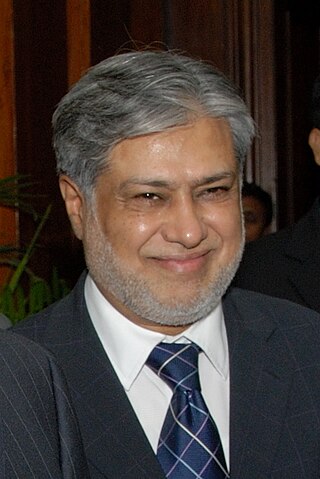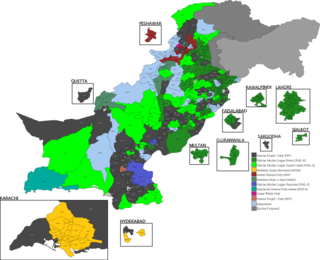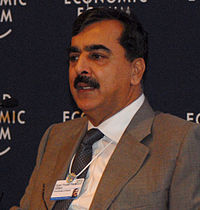
The Pakistan Muslim League (Nawaz) (Urdu: پاکستان مسلم لیگ (ن), abbr.PML(N) or PML-N) is a centre-right, conservative liberal political party in Pakistan. It is currently the third-largest party in the Senate. The party was founded in 1993, when a number of prominent conservative politicians in the country joined hands after the dissolution of Islamic Democratic Alliance, under the leadership of former Prime Minister Nawaz Sharif. The party's platform is generally conservative, which involves supporting free markets, deregulation, lower taxes and private ownership. Although the party historically supported social conservatism, in recent years, the party's political ideology and platform has become more liberal on social and cultural issues; however, members have been accused of using Islamist populist rhetoric. Alongside the Pakistan Tehreek-e-Insaf (PTI) and Pakistan Peoples Party (PPP), it is one of the three major political parties of the country.

The Pakistan Muslim League Urdu: پاکستان مسلم لیگ (ق); Pākistān Muslim Līg (Qāf), Acronyms: PML(Q), PML-Q, PMLQ, "Q League") is a political party in Pakistan. As of the 2018 parliamentary election, it has a representation of 5 seats. It previously served as an ally of former Prime Minister Raja Pervez Ashraf's government, and led a joint election campaign in 2013 alongside Pakistan Peoples Party (PPP) in Punjab and Balochistan provinces against its rival Pakistan Muslim League (N), a fiscally conservative and centre-right force.

The Prime Minister of Pakistan is the head of government of the Islamic Republic of Pakistan. Executive authority is vested in the prime minister and his chosen cabinet, despite the president of Pakistan serving as the nominal head of executive. The prime minister is often the leader of the party or the coalition with a majority in the lower house of the Parliament of Pakistan, the National Assembly where he serves as Leader of the House. Prime minister holds office by virtue of their ability to command the confidence of the National Assembly. The prime minister is designated as the "Chief Executive of the Islamic Republic".

Muhammad Ishaq Dar is a senior Pakistani politician. He was finance minister four times. He is currently a senator of Pakistan.

Zubaida Jalal, is a Pakistani politician, a teacher, libertarian and social activist, who served as the Defence Production Minister from August 2018 until April 2022

Shahid Khaqan Abbasi is a Pakistani politician and businessman who served as the 21st prime minister of Pakistan from August 2017 to May 2018. Abbasi is the senior vice President of the Pakistan Muslim League-N (PML-N), and has been the secretary-general of Pakistan Democratic Movement (PDM), an anti-PTI coalition of political parties in Pakistan. He has been a Member of the National Assembly of Pakistan since October 2018. Previously, he served as a member of the National Assembly for 8 non—consecutive terms since 1988.

Yusuf Raza Gilani is a Pakistani politician who served as the 16th prime minister of Pakistan from 2008 to 2012. He is a veteran of Pakistan People's Party, and is currently serving as the vice-chairman of the party's Central Executive Committee, and in 2021 was elected as a Senator.

General elections were held in Pakistan on 18 February 2008 to elect members of the 13th National Assembly and the four Provincial Assemblies.
Events from the year 2008 in Pakistan.

Raja Pervaiz Ashraf is a Punjabi Pakistani politician, businessman and agriculturist who served as the 19th Prime Minister of Pakistan from June 2012 to March 2013 and as the Speaker of the National Assembly from April 2022 to March 2024. Ashraf was a member of the National Assembly of Pakistan from NA-58 (Rawalpindi-II). He has also served as the Senior Vice President of the Pakistan Democratic Movement (PDM), an alliance of political parties opposed to Imran Khan's PTI party.

Chaudhry Ahmad Mukhtar was a Pakistani politician and businessman who served as the Defence Minister of Pakistan in the PM Yousaf Raza Gillani-led cabinet. He also owned Servis Group and founded Shalimar Hospital.

Khawaja Muhammad Asif is a Pakistani politician who served as the Defence Minister of Pakistan from April 2022 till August 2023. He had also been a member of the National Assembly of Pakistan from August 2018 till August 2023. Previously, he was a member of the National Assembly from 1993 to 1999 and again from 2002 to 2018 and till date. In May, 2019 he took the charge and became the Parliamentary Leader of PML-N in the National Assembly of Pakistan.

Ahsan Iqbal Chaudhary is a Pakistani politician who is serving as the Secretary General of Pakistan Muslim League (N). He was a member of the National Assembly of Pakistan from August 2018 till August 2023. Previously, he was a member of the National Assembly from 1993 to 1999 and from 2008 to May 2018.

Khawaja Saad Rafique is a Pakistani politician who had been a member of the National Assembly of Pakistan from October 2018 till August 2023 and the federal minister for Railways.

Chaudhary Nisar Ali Khan is a Pakistani politician who served as the Interior Minister from 2013 to 2017. He had been a member of the Provincial Assembly of the Punjab from August 2018 till January 2023. He however was unsuccessful in winning a National Assembly seat. A former leader of the Pakistan Muslim League (Nawaz), Khan had been a member of the National Assembly of Pakistan between 1985 and May 2018. He was the Leader of the Opposition in the National Assembly from 2008 to 2013.

The Lawyers' Movement, also known as the Movement for the Restoration of Judiciary or the Black Coat Protests, was the popular mass protest movement initiated by the lawyers of Pakistan in response to the former president and army chief Pervez Musharraf's actions of 9 March 2007 when he unconstitutionally suspended Iftikhar Muhammad Chaudhry as the chief justice of Pakistan's Supreme Court. Following the suspension of the chief justice, the Supreme Court Bar Association (SCBA) declared the judge's removal as an "assault on the independence of judiciary" and was backed by several political parties.
Abdul Qadir Baloch is a Pakistani politician and retired army general who served as Minister for States and Frontier Regions in the third Sharif ministry from 2013 to 2017, and in the Abbasi cabinet from August 2017 to May 2018. A leader of the Pakistan Muslim League (Nawaz), Baloch briefly served as the Governor of Balochistan during Pervez Musharraf rule in 2003.
The Abbottabad Commission was a judicial inquiry commissioned to provide reports on the circumstantial events leading up to the United States decision to take unilateral military actions in Abbottabad in Khyber-Pakhtunkhwa Province of Pakistan, with the objective of neutralizing al-Qaeda leader Osama bin Laden on May 2, 2011. Constituted by the Supreme Court of Pakistan on the request of the Government of Pakistan on 21 June 2011, the commission was chaired by the Senior Justice Javaid Iqbal and other members selected by the Supreme Court.
Zahid Hamid is a Pakistani politician, and lawyer. A member of Pakistan Muslim League (Nawaz), Hamid previously served as the Minister for Law and Justice and Minister of Climate Change in the Third Sharif ministry between 2015 and 2017. He briefly served as the Minister of Law and Justice in June 2013 before being appointed as Minister of Science and Technology from June 2013 to November 2014. He again served as Minister for Law and Justice under Prime Minister Shahid Khaqan Abbasi from August 2017 until he resigned in November 2017.

The Imran Khan ministry was the government of Pakistan which was formed by Imran Khan following his successful election as Prime Minister of Pakistan by the National Assembly. The Cabinet had 25 Federal Ministers, 4 Ministers of state and 4 Advisors, most of whom assumed office on 20 August 2018.




















